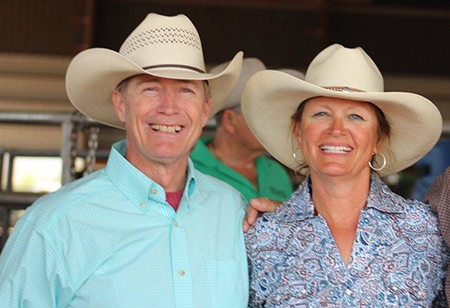
For Dale, it was a cracked rib. Or at least, that's what he thought. Shortly after moving to Arizona for his work as a consultant in the residential service industry, Dale started experiencing pain in his chest. Doctors couldn't determine the cause, even with several imaging tests, but thought he had torn some ligaments in his ribs. They told him that after several weeks of rest, he'd feel better.
After a cross-country trip, Dale returned to Arizona in considerable pain. "It just kept getting worse and worse and worse," he said.
After a few visits to urgent care clinics, he was referred to a pulmonologist. The pulmonologist ordered a needle biopsy, which uncovered the cause of his pain, and it was grim: peripheral malignant neural sheath tumor. This rare form of cancer develops in the network of nerves that connect the brain and spine to other parts of the body.
Dale underwent radiation therapy after an initial surgery at HonorHealth Scottsdale Osborn Medical Center to remove the tumor from his spine.
"I did radiation and seemingly got better," said Dale.
Sherrie, Dale's wife, echoed: "At this point, we think we're in good shape."
However, at his six-month check-up, Dale learned that his cancer had spread, with multiple tumors, including a golf-ball sized tumor in his neck. His oncologist gave him three to six months to live.
"We were told there was nothing they could do," said Dale.
"We were devastated," his wife added.
Looking for hope where there was none
Dale and Sherrie set out to find options that might help. He tried naturopathy for a time. While he believes that the treatments helped him build strength, his cancer continued to grow rapidly.
He started having difficulty breathing and had to take considerable pain medication regularly. Sherrie attended most of his appointments so she could better understand his treatment, and because Dale was on so much medication that he wouldn't remember everything the doctors told him.
During a visit with his oncologist, his doctor suggested he contact Michael Gordon, MD, medical director of the HonorHealth Research Institute. After reviewing Dale's files and scans, Dr. Gordon immediately sent him to surgery to remove an additional tumor in his spine, followed by CyberKnife radiation targeted at the surgical site. Once Dale healed, he joined a cancer clinical trial that uses immunotherapy as the therapy protocol.
What is immunotherapy?
"Dr. Gordon explained immunotherapy to us like this," said Dale. "A cancer cell has a trigger, and that starts firing. Immunotherapy takes the trigger off, so it's like a gun without a trigger. Your immune system can get back up again and can get rid of the cancer cells so they can't reproduce."
Immunotherapy is a class of cancer treatments that help your body's immune system recognize and eliminate cancer cells from your body. Patients receive immunotherapy most commonly as an intravenous infusion or in some cases, as pills, depending on the compound. Patients can have side effects such as autoimmune disorders, hypothyroidism (low functioning of thyroid gland), hypopituitarism (a condition caused by failure of the pituitary gland) or inflammation of the lungs or colon. Fortunately, Dale has not had any side effects.
A dramatic, rapid improvement
"I had a tumor on my neck that Dr. Gordon did not want to remove as it was easy for him to draw biopsy samples from it," Dale said. After the second round of immunotherapy, the tumor had shrunk so much they had to use a scan to find the tumor.
"We predicted that Dale was a good candidate for immunotherapy after profiling his tumor and seeing what is now termed as a ‘high tumor mutational burden.' This means that the tumor is extremely bizarre in its genetic appearance and is therefore easier for the immune system to identify," Dr. Gordon said.
Today, one year after starting immunotherapy treatments, Dale is getting back to enjoying life. He's working part time. He's begun riding horses again, and won a competition belt buckle in cowboy mounted shooting in Tombstone, Ariz., over Thanksgiving. "My wife and I won our divisions and got buckles that day," said Dale. "That was a huge milestone for me."
"Considering where Dale was and where he is now — if you wanted to see a successful before and after of someone — Dale would be it," said Patricia Shannon, research nurse supervisor for HonorHealth Research Institute. "He could barely walk when he first came in due to his cancer pain."
He will continue to receive infusions every three weeks and have periodic scans to determine his progress every three months.
"We strive to give patients time and good quality of life," said Patricia. "We've been able to give Dale both."